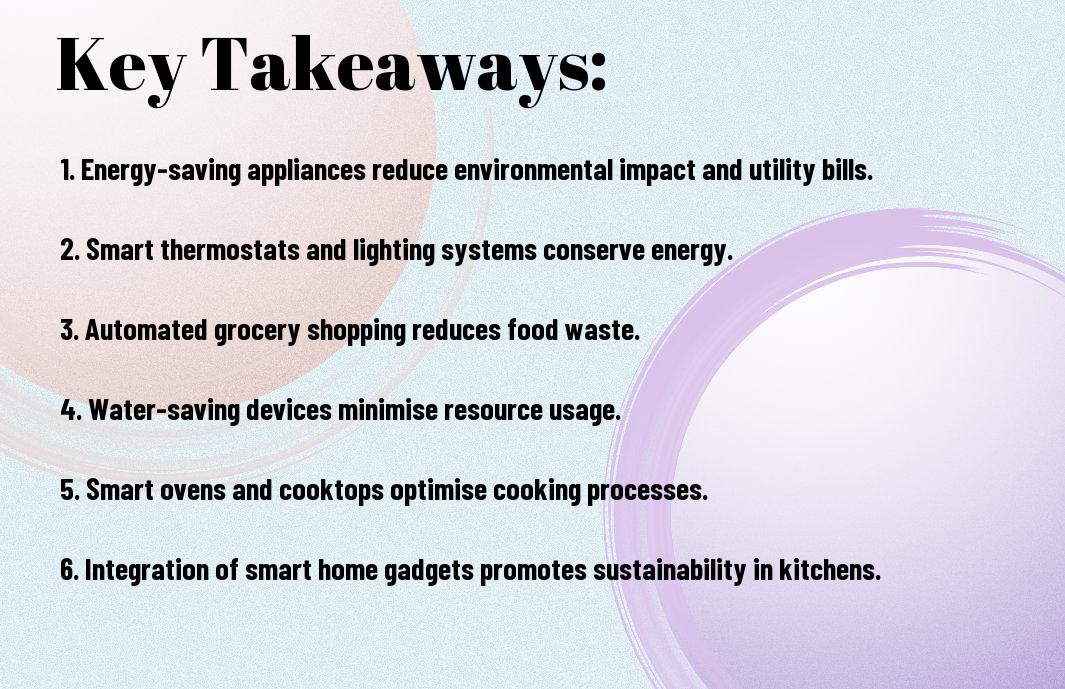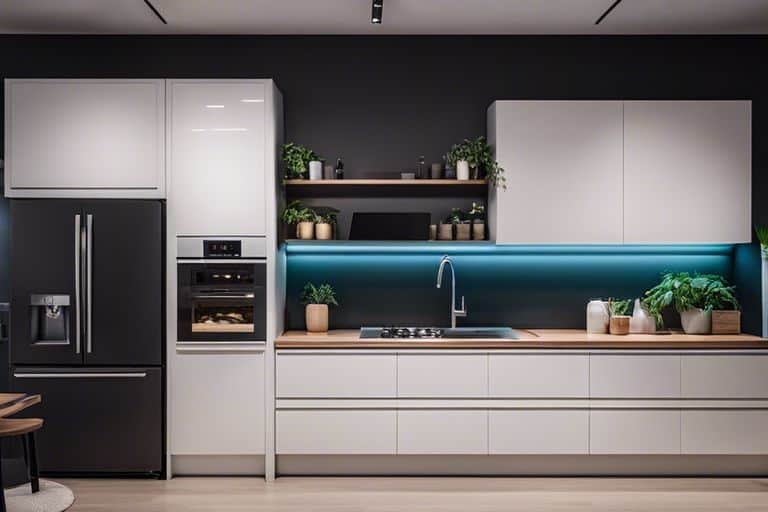Embrace the future of cooking by incorporating smart home gadgets into your kitchen. By utilizing these innovative devices, you can significantly improve the efficiency and sustainability of your cooking space. From reducing energy consumption to minimizing food waste, these gadgets offer a range of benefits that will not only make your cooking experience easier and more convenient, but also contribute to a healthier planet. In this blog post, you will learn about the various ways in which smart home gadgets can transform your kitchen into a more eco-friendly and efficient space, thus helping you to make a positive impact on the environment.
Key Takeaways:
- Energy Efficiency: Smart home gadgets in the kitchen contribute to energy efficiency by optimising usage and reducing waste.
- Resource Conservation: These gadgets aid in the conservation of resources such as water and food through automated processes and smart monitoring.
- Waste Reduction: By promoting precise portions and smart inventory management, smart home gadgets help reduce food waste in the kitchen.
- Eco-friendly Practices: These gadgets facilitate eco-friendly practices by promoting sustainable choices and reducing the carbon footprint of kitchen operations.
- Convenient Living: Smart home gadgets enhance convenience and facilitate a more efficient and sustainable lifestyle in the kitchen, leading to environmental benefits.
Energy Efficiency in the Smart Kitchen
When it comes to creating a more efficient and sustainable kitchen, one of the most significant contributions that smart home gadgets can make is in the area of energy efficiency. By harnessing the power of technology, you can significantly reduce the amount of energy consumed in your kitchen, ultimately lowering your carbon footprint and saving money on utility bills.
Smart Appliances and Their Role in Energy Conservation
Smart appliances such as refrigerators, dishwashers, and ovens are designed to be more energy-efficient than their traditional counterparts. They often feature energy-saving modes that automatically adjust settings to reduce power consumption when they are not in use. Additionally, many smart appliances are equipped with smart sensors that can detect when the appliance is not in use and switch to standby mode, further reducing energy waste.
Automated Systems for Minimizing Waste
Smart home gadgets can help you minimise waste in your kitchen by automating processes that would otherwise lead to energy consumption. For instance, automated lighting systems can turn off lights in unoccupied rooms, reducing unnecessary electricity usage. Similarly, smart thermostats can regulate heating and cooling to prevent energy waste, adjusting the temperature based on your usage patterns and preferences.
The Sustainable Kitchen
Creating a more sustainable kitchen doesn’t just involve using organic produce and eco-friendly cleaning products. It also involves implementing smart gadgets and technology to reduce your carbon footprint and promote greener living. You may wonder how smart home gadgets contribute to a more efficient and sustainable kitchen. According to What is a Smart Home and How Does it Support Green Living, smart home gadgets can significantly impact energy efficiency and environmental sustainability in your kitchen.
How Smart Gadgets Reduce Carbon Footprint
Smart home gadgets, such as energy-efficient appliances, smart thermostats, and lighting controls, can help you reduce your carbon footprint. They are designed to optimise energy usage and reduce waste, which ultimately contributes to a greener environment. For example, utilising a smart thermostat allows you to control the temperature of your kitchen more efficiently, saving energy and reducing your impact on the environment. By investing in these smart technologies, you can effectively lower your energy consumption and environmental impact in the kitchen.
Promoting Eco-Friendly Practices with Technology
Smart gadgets not only reduce your energy consumption but also promote eco-friendly practices in the kitchen. For example, smart fridges with inventory tracking features can help you minimise food waste by alerting you when items are about to expire. Additionally, smart kitchen devices, such as water-saving faucets and energy-efficient cooking appliances, help you conserve resources without compromising the functionality of your kitchen. By integrating these technologies into your daily routine, you can actively contribute to a more sustainable lifestyle while enjoying the convenience of modern kitchen amenities.
Smart Kitchen Management
When it comes to managing your kitchen efficiently, smart home gadgets play a crucial role in simplifying your daily tasks. These gadgets are designed to automate various processes, monitor energy usage, and provide valuable insights that can help you make informed decisions about your kitchen activities. If you’re wondering What is a smart home and what are the benefits?, you’ll find that smart kitchen gadgets are a significant part of the answer.
Integration of IoT Devices for Enhanced Functionality
Smart kitchen gadgets, such as smart refrigerators, ovens, and dishwashers, can be seamlessly integrated with IoT devices to enhance their functionality. These devices can communicate with each other and with your smartphone, allowing you to control them remotely. For example, you can preheat your oven on your way home from work, or receive notifications on your smartphone when your groceries are running low. This level of connectivity not only saves you time and effort but also contributes to a more efficient and sustainable kitchen by reducing wastage and energy consumption.
Data-Driven Decision Making for Grocery Shopping and Storage
By leveraging the data collected by smart kitchen gadgets, you can make better-informed decisions when it comes to grocery shopping and storage. For instance, smart refrigerators can keep track of the items inside them and their expiration dates, sending you alerts when it’s time to use or restock certain items. This not only prevents food spoilage but also helps you plan your meals more efficiently, reducing unnecessary purchases. Additionally, smart storage containers with built-in sensors can monitor the freshness of your produce, ensuring that you use them before they go bad. This data-driven approach to kitchen management can significantly reduce food waste and save you money in the long run.
The Future of Smart Kitchens
As technology continues to advance at a rapid pace, the future of smart kitchens looks promising. With the advent of more sophisticated smart home gadgets, including intelligent appliances and connected devices, the kitchen of tomorrow is set to become even more efficient, sustainable, and user-friendly.
Innovations on the Horizon
One of the most exciting prospects for the future of smart kitchens is the integration of artificial intelligence (AI) and machine learning. This will enable your kitchen appliances to learn from your usage patterns, anticipate your needs, and automate tasks, making your daily cooking routine more efficient. Additionally, advancements in IoT (Internet of Things) technology will allow for seamless connectivity between different kitchen devices, enabling them to communicate and work together to streamline your cooking processes. With the incorporation of sensor technology, your smart kitchen will be able to provide real-time feedback on energy usage and food wastage, helping you to make more sustainable choices. Furthermore, the development of voice recognition technology will allow you to operate your kitchen gadgets hands-free, making cooking even more convenient and accessible.
Potential Challenges and Considerations
While the future of smart kitchens holds great promise, there are also potential challenges and considerations to be mindful of. The reliance on technology in the kitchen may pose security and privacy risks, as smart devices could be vulnerable to hacking or data breaches. It is crucial to ensure that robust security measures are in place to safeguard your personal information and prevent unauthorized access to your smart kitchen appliances. Moreover, as smart kitchens become more interconnected, interoperability and compatibility between different devices could become a concern. You will need to carefully consider the compatibility of your existing devices and ensure that they can seamlessly integrate with newer technologies to avoid potential issues. Additionally, the proliferation of technology in the kitchen raises questions about the environmental impact of electronic waste. It is important to consider the lifecycle of smart kitchen gadgets and their impact on the environment, and to make informed decisions to minimise electronic waste and promote sustainability in your kitchen.

Smart Home Gadgets for an Efficient and Sustainable Kitchen
Considering all points, it is clear that smart home gadgets can significantly contribute to a more efficient and sustainable kitchen. These gadgets can help you reduce energy and water consumption, eliminate food waste, and streamline your cooking and meal planning processes. By using smart appliances, sensors, and automated systems, you can achieve greater efficiency in your kitchen and contribute to a more sustainable lifestyle. Embracing these technologies not only makes your life easier, but also positively impacts the environment by reducing your ecological footprint. Investing in smart home gadgets for your kitchen is a practical and impactful step towards creating a more efficient and sustainable living space.
FAQ
Q: How do smart home gadgets contribute to a more efficient and sustainable kitchen?
A: Smart home gadgets contribute to a more efficient and sustainable kitchen by automating tasks, reducing energy consumption, and minimizing food waste.
Q: What are some examples of smart home gadgets for a sustainable kitchen?
A: Examples of smart home gadgets for a sustainable kitchen include energy-efficient appliances, smart thermostats, connected kitchen scales, and food management systems.
Q: How do energy-efficient appliances contribute to a sustainable kitchen?
A: Energy-efficient appliances help reduce electricity usage, lowering your carbon footprint and saving you money on utility bills in the long run.
Q: What role do smart thermostats play in a sustainable kitchen?
A: Smart thermostats allow you to control the temperature of your appliances remotely, thereby optimizing energy usage and reducing waste.
Q: How can connected kitchen scales contribute to a sustainable kitchen?
A: Connected kitchen scales help you measure ingredients accurately, reducing food waste and promoting sustainable cooking practices.
Q: How do food management systems make a kitchen more efficient and sustainable?
A: Food management systems help track food inventory, suggest recipes based on available ingredients, and minimize food waste by ensuring everything is used before it spoils.
Q: Are there any other ways smart home gadgets can contribute to a sustainable kitchen?
A: Yes, smart home gadgets can also help monitor water usage, regulate indoor air quality, and provide insights into your overall energy consumption, all of which contribute to a more sustainable kitchen environment.
